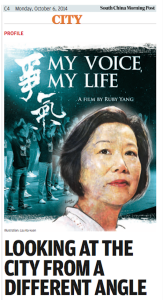Filmmaker Ruby Yang: looking at the city from a different angle
by Oliver Chou
The last time Ruby Yang saw protests like the ones gripping Hong Kong in the past week was the 1967 riots. But she was too young then to make a documentary film on them.
Fast-forward to 2014, and the filmmaker has again missed the opportunity – because she wasn’t around.
“Had I been in Hong Kong for the past three years, I would have,” she said.
Yang, born in Hong Kong and based in San Francisco since 1977, has focused her energies in the last decade on mainland China – the setting for her documentary on AIDS that won an Oscar in 2007.
But the master at, in her own words, “putting a human face” on issues is considering a documentary about her birthplace by 2017 – starting with footage of the Occupy protests.
“It will be 20 years since I did a documentary on the identity of people in Hong Kong, during the 1997 handover,” she said, referring to her film, Citizen Hong Kong. “It would be interesting to look back on those two decades and the subtle changes in between.”
The director still remembers the indomitable spirit of the locals she interviewed in 1996 and 1997 for the project.
“They might have been uncertain about the future, but they were absolutely confident about their identity as Hong Kong citizens and proud of it.”
But now, all she sees is a “highly polarised” city. “Perhaps that is why I want to sit out, keep a cool mind, and take a broader perspective before I start my camera rolling,” she said. “After all, I film documentaries, not news, which requires battling on the front line for the latest.”
The human condition is a strong focus for Yang’s work, especially aspects few people pay attention to, or those that can be seen from “a special angle” – which she says inspires her to dedicate her time and resources to a project.
It was this dedication to giving voice to ordinary people that gave her the Oscar-winning angle of portraying mainland orphans who had lost their parents to AIDS. “Instead of finger-pointing, my theme was the stigma those young children were subjected to, and so it put a human face on the disease called AIDS,” she said.
Last year, Yang returned to her hometown after being deeply moved watching rehearsals for a musical in Hong Kong. One student had recently lost his vision and was using Braille to join in. The result is My Voice, My Life, her latest documentary, which she shot before she settled into her new role as a visiting scholar at the University of Hong Kong.
The 91-minute film, which will be screened in local cinemas next week, follows a group of underprivileged high school teens who overcome disability or low self-esteem by taking part in a musical over summer last year. The film charts their transformation into self-assured individuals taking control of their lives.
It presents a challenge to viewers to define what success means for marginalised youth in the city. “Did unsatisfactory conduct or academic grades define me as bad?” Hong Kong movie star Andy Lau Tak-wah, who plays no part in the production, asks in the movie trailer.
Yang wanted to show the character of young Hongkongers. “The typical traits of Hong Kong youngsters – such as total free rein, inventiveness and quick reactions – are what inspired me to make this documentary,” she said. She also notes that times have most definitely changed since she last lived in Hong Kong.
“This young generation that’s just about to come of age were all born after 1997. With social media, they know more and demand more. They can go into the bathroom and use their phone to send a message to a friend without their parents knowing.
“Without work experience or any setbacks on their road of life, they are fresh and idealistic. They dare to think and act, and that could be a little dangerous.”
Parents featured in Yang’s film at times appear more fragile than their children. One broke down in tears when she saw, on screen, her daughter’s determination, against the odds, to go back to school, Yang said.
“The nine characters … experience some degree of disparity with their parents,” she said. “As the ending shows, many problems can be resolved through dialogue. They just need to sit down and talk. I guess that’s also true for Hong Kong at large.”
It also struck Yang while filming the documentary that today’s mainland immigrants are a very different crop from those she encountered in Citizen Hong Kong. “The new immigrants then were very agreeable about their children taking part in the film. But now they are resistant. One even wanted to change or remove altogether her daughter’s part.”
Beyond the film, Yang says she has also noticed an apathy towards the mainland among the students in her Academy for Performing Arts film-editing class – even when watching her documentary on the AIDS orphans.
“It was not so when I first started teaching the course there in 2007,” she said, adding that the change in attitude could be to do with media stereotypes of mainlanders. “It may be easier for [my mainland interviewees] to give a quote to print media,” she said. “But for them to talk in front of a camera, it is so much more difficult than before.”
Yang said making My Voice, My Life – which shows anyone has the potential for success – gave her hope for the new generation.
And she said the civic spirit behind the mass protests had only confirmed that belief.
She spoke enthusiastically of a recent experience: “I passed by a stall at an Admiralty MTR exit the day after police used tear gas on the protesters. It was for an AIDS anti-discrimination campaign organised by an NGO. That was a true sign of a civic society and I was very moved by it.”
And in keeping with the theme of her latest film, Yang noted that everyone deserved an opportunity.
“Don’t look down on young people. Give them an opportunity, and you’ll be surprised.”
Ruby Yang
Position Hung Leung Hau Ling distinguished fellow in humanities, HKU, since last year
Award Best documentary (short film) for The Blood of Yingzhou District at the 79th Academy Awards, 2007
Education San Francisco Art Institute in painting and filmmaking
Family Married to theatre executive and film producer Lambert Yam
See SCMP’s article here




